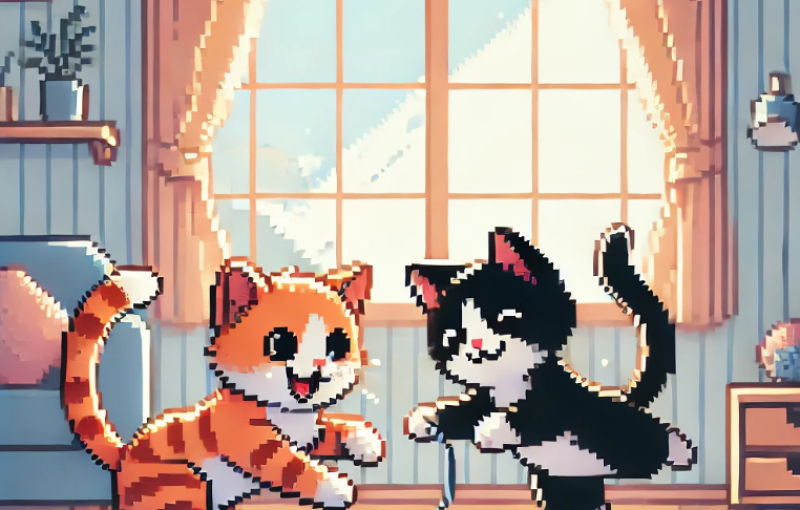
Social Cats: Are Your Furry Friends Smarter Than You Think?
by Jon Scaccia September 25, 2024Did you know that socialization can make your cat smarter? Recent research has shown that cats that are more socialized to humans not only bond better but also have enhanced problem-solving skills. That’s right! The way your kitty interacts with you might directly influence how well they can crack a tricky puzzle. But what does this mean for you as a pet owner? And how can this knowledge help improve your relationship with your feline friend? Let’s dive into the fascinating findings of this study and explore the intriguing connection between cat socialization and their ability to solve problems.
How Socialization Boosts a Cat’s Brain Power
Domestic cats (Felis catus) are known for their independence and adaptability, capable of thriving in various environments—from cozy homes to urban streets. While they may have a reputation for being aloof, many cats form strong social bonds with humans, especially when exposed to them during a critical “sensitive period” early in life. Socialization during this window (between 2 to 7 weeks of age) makes kittens more comfortable around humans, which is crucial if they’re going to live harmoniously as pets.
But the benefits of socialization don’t stop at making your cat-friendly. This study from the McKamey Animal Center in Chattanooga, TN, found that socialized cats were also better problem-solvers. The researchers gave 86 shelter cats a puzzle box with a hidden food reward inside. The task required the cats to pull a tab to release the treat, and they measured how quickly and efficiently the cats solved the puzzle. The results? More socialized cats not only approached the box sooner but also solved the puzzle faster than their less social counterparts.
So, what’s going on here? The researchers suggest that socialization may enhance cognitive abilities, making cats more curious and less fearful of novel situations—like figuring out how to get that treat out of the box!
Why Younger Cats Have the Edge
In addition to socialization, age played a big role in the cats’ problem-solving abilities. Younger adult cats outperformed their older peers when it came to solving the puzzle. This makes sense if you think about how energetic and curious younger cats tend to be. As with humans, younger brains may be more flexible and better suited to tackling new challenges.
However, this doesn’t mean that older cats can’t learn new tricks! If your senior cat doesn’t seem as quick to explore new things, it might be because they’re set in their ways, not because they’re incapable of learning. Engaging older cats in new, stimulating activities could still benefit their cognitive health.
What This Means for Pet Owners
As a pet owner, this research highlights the importance of early socialization for your cat’s overall well-being and intelligence. If you have a young kitten, make sure to expose them to as many positive human interactions as possible. This doesn’t mean overwhelming them, but gently introducing them to being handled, petted, and played with will set them up for a lifetime of healthy social behavior—and maybe even make them better at solving problems.
But what if your cat didn’t have that early socialization? Don’t worry! While early life is important, cats are adaptable animals, and you can still improve their social skills with patience and consistent, positive interactions. Spend time engaging with your cat in activities they enjoy, whether it’s playtime with a feather toy or gentle petting sessions. This study suggests that socialization isn’t just about making your cat friendlier—it could help their brain stay sharp too.
The Broader Picture: What We Can Learn from Socialized Cats
The findings of this study also have broader implications. It shows that animals, including cats, don’t exist in a vacuum. Their environment and interactions, especially with humans, shape their cognitive abilities and behaviors. This insight could extend beyond just our furry companions at home. For example, it mirrors findings in other animals like orangutans and hyenas, where socialization and exposure to humans enhanced problem-solving abilities.
This kind of research challenges the long-standing idea that intelligence is purely a fixed trait. Instead, it suggests that intelligence and cognitive flexibility can be influenced by social and environmental factors—whether we’re talking about cats or other animals. This could even apply to how we think about our interactions with other pets, like dogs or birds.
Practical Tips for Fostering Socialization
Ready to help your cat become more social and maybe even smarter? Here are some simple ways you can encourage socialization and mental stimulation in your furry friend:
- Early Exposure: If you’re adopting a kitten, make sure they’re exposed to plenty of gentle human contact early on. Handle them often, speak to them softly, and encourage positive interactions.
- Interactive Play: Playtime isn’t just for burning energy—it also challenges your cat’s brain. Use puzzle feeders or toys that require problem-solving, like food mazes or treat-dispensing balls.
- Routine: Cats love routine, but a little variation can stimulate their brains. Introduce new toys, rotate their favorite activities, or even rearrange their play area to encourage exploration.
- Positive Reinforcement: If your cat is shy or less socialized, use positive reinforcement like treats or praise to reward them when they engage with you. Gradually increase their exposure to new people and environments.
By fostering socialization and keeping your cat’s mind engaged, you’re not only helping them become more comfortable around humans but also keeping their brain sharp and healthy.
Join the Conversation
What do you think? Has your cat shown signs of being a clever problem-solver? Have you noticed a difference in behavior between younger and older cats? We’d love to hear your stories! Share your thoughts in the comments below or join the conversation on social media.
Leave a Reply